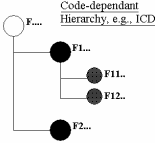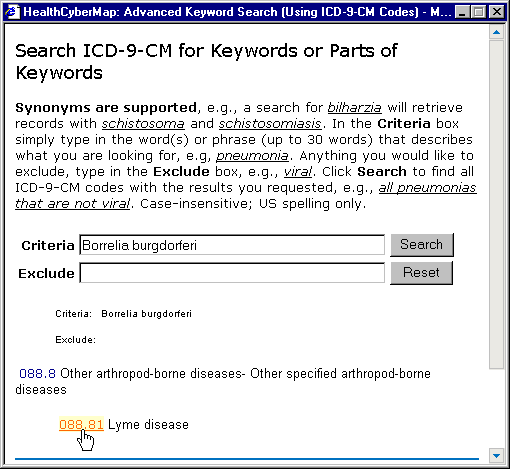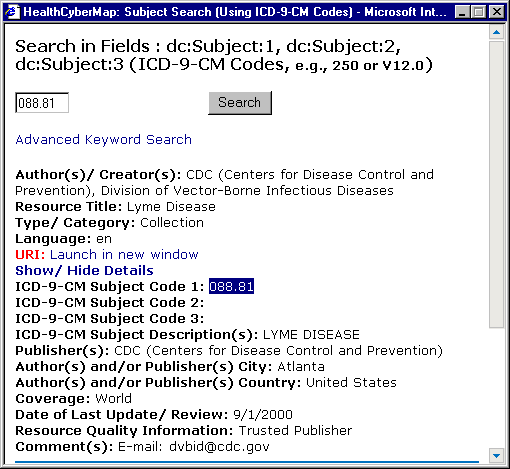Towards a Medical Semantic Web
 HealthCyberMap Subject Search forms: Search ICD-9-CM-coded health and medical Web resources in HealthCyberMap database using either ICD-9-CM numeric codes or their short and long medical textual descriptions and synonyms (Advanced Keyword Search); you can also find related codes to the ones you are seeking, e.g., subtypes of some disease condition in ICD's hierarchy, and retrieve matching Web resource records in HealthCyberMap database. See also: Semantic Subject Search Example below.
HealthCyberMap Subject Search forms: Search ICD-9-CM-coded health and medical Web resources in HealthCyberMap database using either ICD-9-CM numeric codes or their short and long medical textual descriptions and synonyms (Advanced Keyword Search); you can also find related codes to the ones you are seeking, e.g., subtypes of some disease condition in ICD's hierarchy, and retrieve matching Web resource records in HealthCyberMap database. See also: Semantic Subject Search Example below.
HealthCyberMap Resource Index Using ICD-9-CM Top-Level Categories (Text).
Electronic Patient Record-HealthCyberMap Problem to Knowledge
Linking Demonstration: ICD-9-CM Codes as Problem to Knowledge Linkers or Knowledge Hooks.
In the USA, physicians must use ICD-9-CM codes to refer to diagnoses (mainly for billing
purposes). These codes can also act as crisp knowledge hooks for medical problem to knowledge linking.
HealthCyberMap in Protégé: Download ontology for Protégé-2000 v1.6 presented at the Fifth International Protégé Workshop, Sowerby Centre for Health Informatics at Newcastle (SCHIN), University of Newcastle upon Tyne, Newcastle, UK (July 2001)
Download two
PowerPoint 97 presentations (zipped) on the use of clinical codes as part of the
proposed resource metadata set for the UK's National electronic Library for
Health (NeLH) to crisply and unambiguously describe the subjects and topics of
Web resources, thus enhancing information retrieval (ensuring contextual
relevance and improving the "signal-to-noise ratio" of search
results) and enabling problem to knowledge linking.
By making medical Web resources more meaningful to computers, i.e., making their
context and meaning (semantics), not merely their raw text and formatting, amenable to
computer "understanding" and processing, we can hopefully end up with an
"intelligent" medical Web that is more meaningful to the public,
patients and their caregivers, and more relevant to the medical questions they
ask and the specific clinical problems they face. Clinical codes like SNOMED-CT
(a terminology or nomenclature) or ICD (a classification) can help achieving
this by acting as basic (template) medical ontologies for mapping the health cyberspace. A terminology (or classification) is a kind of ontology by definition and it should preserve (and "understand") the relationships between the 1,000s of terms in it or else it would become a mere dictionary (or at best a thesaurus). By labelling or tagging a resource with clinical codes, we are automatically establishing the relationships (as defined by the coding scheme used to tag the resource) between this resource and related (tagged) resources in the medical Web and also the Electronic Patient Record.
N.B.: Definition of "Ontology": A domain of discourse for
describing some reality. A set of concepts, the attributes of those concepts,
and the relationships among concepts that characterise a given application area
(van Bemmel and Musen, 1997). See also: SemanticWeb.org.
A Semantic Subject Search Example
A search for "Borrelia burgdorferi" retrieves resources on "Lyme disease" (ICD-9-CM code: 088.81). Note that in the second screenshot below, the words "Borrelia burgdorferi" are not present in the retrieved resource metadata record.
N.B.: Lyme disease --is-caused-by--> Borrelia burgdorferi (organism). Ideally, search results should be classified according to how semantically close a match is to user query into direct matches (including synonyms), e.g., resources dealing primarily with the organism, Borrelia burgdorferi, in this example, and related matches (based on semantic relationships), e.g., resources covering topics related to Borrelia burgdorferi like Lyme disease, to use the same example. However, we couldn't implement this classification of returned matches in this prototype search engine due to limitations in both ICD-9-CM and the way relationships are represented in the current tool.


Back to Home Page
© 2001, 2002 HealthCyberMap.org. All Rights Reserved.
 HealthCyberMap Subject Search forms: Search ICD-9-CM-coded health and medical Web resources in HealthCyberMap database using either ICD-9-CM numeric codes or their short and long medical textual descriptions and synonyms (Advanced Keyword Search); you can also find related codes to the ones you are seeking, e.g., subtypes of some disease condition in ICD's hierarchy, and retrieve matching Web resource records in HealthCyberMap database. See also: Semantic Subject Search Example below.
HealthCyberMap Subject Search forms: Search ICD-9-CM-coded health and medical Web resources in HealthCyberMap database using either ICD-9-CM numeric codes or their short and long medical textual descriptions and synonyms (Advanced Keyword Search); you can also find related codes to the ones you are seeking, e.g., subtypes of some disease condition in ICD's hierarchy, and retrieve matching Web resource records in HealthCyberMap database. See also: Semantic Subject Search Example below.
